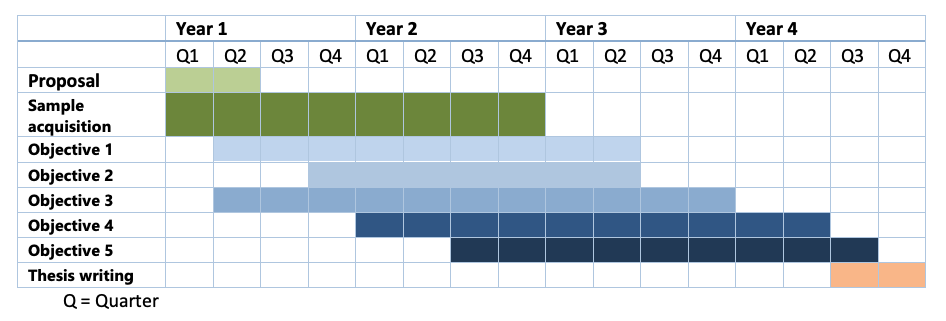Muriel
Aguilar Bretones

Project
Tags
Promotor
prof.dr Marion P.G. Koopmans
Co-promoter(s)
dr. Gijsbert P. van Nierop
Institute(s)
Erasmus MC
Description PhD project
Arbovirus infection or vaccination induce a strong and broad antibody response that protects the host from reinfection with the same virus. Exposure to antigenically related heterologous virus strains favors highly cross-reactive antibodies induced by memory B cell responses. This results in complex antibody landscapes which may protect from disease – by aiding in viral clearance, e.g. virus cross-neutralization – or enhance disease due to immunopathogenic mechanisms. Pre-existing heterotypic antibodies may cause 1) antibody dependent enhancement (ADE) of infection, which leads to altered immune responses or increased viral replication, 2) a delayed onset, or magnitude of a new type-specific response, termed original antigenic sin. In the complex spectrum of serum antibodies is unclear which antibody clones are protective or pathogenic, and what their impact is on the clinical outcome of infection. We will study the humoral immune response at the clonal level using a recently developed B-cell platform to correlate antigen specificity and phenotype of antibodies with their functional contribution to disease outcome.
Research questions / objectives
- What does the antibody repertoire look like after arbovirus infection/vaccination?
- How does the antibody landscape evolve after homologous and heterologous infection/vaccination?
- What is the antibody cross-reactivity pattern among antigenically related viruses?
- How does the antigen-specificity and phenotype of antibodies impact function?
- What is the clinical impact of pre-existing and newly induced antibody profiles after arbovirus infection?
Timeline

Tags matching with the contents of track 3
Methods
-
Labwork
- PCR: Amplification of complementary determining regions of antibodies
- ELISA: Custom and multiplex readout of quantifying antibody reactivity will be setup
- B-cell profiling: This is the main technical aim of my project and may complement studies on other components of the immune response, immune pathogenesis, virulence, vaccine efficacy and safety
- RNA/DNA extraction: Used to study B-cell receptor sequences and virus genome copies
- Virus neutralization: Part of functional analysis of antibodies
- In vivo: Antibodies characterized in our studies may be used in animal models to address their clinical impact. This research will be performed in collaboration
- In vitro: Primary B-cells will be analysed in depth using in vitro culture systems
- Next generation sequencing (NGS): NGS of B-cell receptor analysis could be combined with in vitro antigen-specific analysis of clones
- Molecular Cloning: Variable regions of B-cell receptors will be cloned and expressed to generate recombinant antibody clones
- Ex Vivo: Immune cells from peripheral blood or target tissues will be phenotypically characterized
- Plaque Assay: Part of functional analysis of antibodies
- Living animal experiment: Antibodies characterized in our studies may be used in animal models to address their clinical impact. This research will be performed in collaboration
Fieldwork
- Public health surveillance: Peripheral blood mononuclear cells of arbovirus vaccinees or infected individuals are required for our research
Literature
- Literature review: Analysis of literature is an integral part of my project. However, so far a review manuscript is not planned
Topics
-
Host:
- Host immune response: I will mainly study the humoral immune response of arbovirus vaccinees and infected individuals. The interaction of antibodies and antibody-antigen complexes with other immune cells could be also studied
- Host susceptibility: The effect of pre-existing antibodies on arbovirus susceptibility is a primary objective
- Host Seroprevalence: We will use serological tools to define the immunological background of study subjects
Virus:
- Pathogenicity: We study antibody responses as they are a main component of the correlate of immune protection and immunopathogenesis
- Virus-host interaction: We study antibody responses as they are a main component of the correlate of immune protection and immunopathogenesis
Interventions:
- Vaccines: The B-cell platform that we develop in my project is very well suited to study vaccine efficacy and safety
- Improved surveillance( response surveillance): Custom and multiplex serological assays developed in my project may be implemented for epidemiological and surveillance studies
- Diagnostics: Custom and multiplex serological assays developed in my project may be implemented in diagnostics
- Other interventions: Potentially, antibodies with therapeutic potential will be identified in our studies
Species
-
Species:
- Human: In my project I will mainly focus on the clinical impact of humoral immunity in humans
Virus
-
Virus:
- Virus (general): Immunity towards all virus strains relevant for the OHP will be of interest for my project
- West Nile virus: Immunity towards all virus strains relevant for the OHP will be of interest for my project
- Usutu Virus: Immunity towards all virus strains relevant for the OHP will be of interest for my project
- Japanese Encephalitis Virus: Immunity towards all virus strains relevant for the OHP will be of interest for my project
- Dengue Fever Virus: Immunity towards all virus strains relevant for the OHP will be of interest for my project
- Yellow Fever Virus: Immunity towards all virus strains relevant for the OHP will be of interest for my project
- Zika Virus: Immunity towards all virus strains relevant for the OHP will be of interest for my project
- Tick-Borne Encephalitis Virus: Immunity towards all virus strains relevant for the OHP will be of interest for my project
- Chikungunya Virus: Immunity towards all virus strains relevant for the OHP will be of interest for my project
- Sindbis Virus: Immunity towards all virus strains relevant for the OHP will be of interest for my project
- Mayaro Virus: Immunity towards all virus strains relevant for the OHP will be of interest for my project
- Rift Valley Fever Virus: Immunity towards all virus strains relevant for the OHP will be of interest for my project